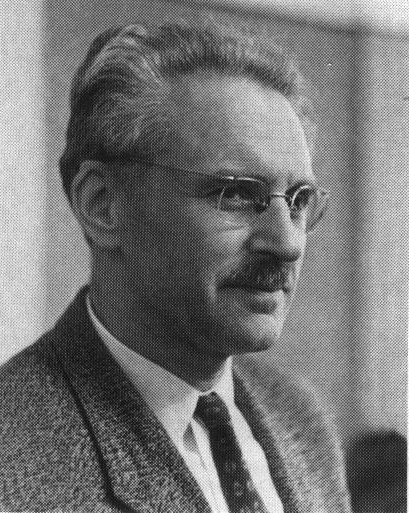<Back to Index>
- Mathematician Aleksandr Danilovich Aleksandrov, 1912
- Writer Witold Marian Gombrowicz, 1904
- Grand Ayatollah Sayyid Ali al-Husayni al-Sistani, 1930
PAGE SPONSOR

Aleksandr Danilovich Aleksandrov (Russian: Алекса́ндр Дани́лович Алекса́ндров, alternative transliterations: Alexandr or Alexander, and Alexandrov) (August 4, 1912 – July 27, 1999), was a Soviet / Russian mathematician, physicist, philosopher and mountaineer.
Aleksandrov graduated from the Department of Physics of Leningrad State University. His advisors there were Vladimir Fok, a physicist, and Boris Delaunay, a mathematician. In 1933 Aleksandrov worked at the State Optical Institute (GOI) and at the same time gave lectures at the Department of Mathematics and Mechanics of the University. He completed his Ph.D. in 1935 at the University and later in 1937 — a D.Sc. dissertation. He became a professor at the University, while also working at LOMI, the Leningrad Department of the Steklov Mathematical Institute (now PDMI, Petersburg Department of the Mathematical Institute). In 1951 he joined the Communist Party. Appointed the rector of the university in 1952, Aleksandrov remained in this position until 1964. In 1946 he became a corresponding member, and in 1964 — a full member of the USSR Academy of Sciences. Since 1975 he was also a member of the Accademia Nazionale dei Lincei.
Aleksandr Aleksandrov should not be confused with Pavel Alexandrov, another mathematician at the Steklov Institute.
Since 1964 and until 1986 Aleksandrov lived in Novosibirsk, heading the Laboratory of Geometry of the Institute of Mathematics of the Siberian Division of the USSR Academy of Sciences, teaching at Novosibirsk State University. In 1986 he returned to Leningrad (now Saint Petersburg), to head the geometry laboratory at LOMI. Aleksandrov received the Stalin Prize (1942), the Lobachevsky International Prize (1951) and the Euler Gold Medal of the Russian Academy of Sciences (1992) among other awards. One of many orders that he was awarded was given to him in 1990 for his active defense of genetics during the period when it was declared a pseudoscience in the Soviet union and fought against (Lysenkoism).
Aleksandrov wrote a multitude of books, scientific papers, textbooks for various levels (schools to universities). He also wrote non-mathematical papers, memoirs about famous scientists, and philosophical essays dealing with the moral values of science.